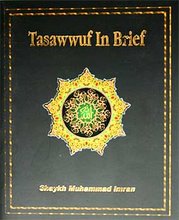Sunday, 29 August 2010
Wednesday, 11 August 2010
Cleansing and Adorning Oneself in the Month of Ramadan
A brief insight to the islahi majlis of My Respected Teacher, Shaykh Imran ibn Adam
Sunday 8th August 2010
It is a principle of all things in this world that nothing can become perfect until it is cleared of all defective aspects. For example, no plant will grow perfectly until it's place of growth is cleared of all harmful features. Likewise, paint can not be applied to a car until the rust is cleared off. Like this, we can apply this principle to all areas. In the same way, we must clear our lives of all defective actions and carry out righteous acts which will then build us up to becoming good people.
So, on one hand we have the "munakaraat" i.e. those things that are forbidden, and on the other hand we have the "ma'muraat" i.e. those things that we have been commanded to do. The former are the defective aspects that we must avoid, and the latter are the righteous acts that we must adopt. We must do takhliya (cleansing) of the former and do tahliya (adorning) by means of the latter.
The blessed month of Ramadan contains practice for us for this process. As soon as the moon is sighted for the beginning of Ramadan, twenty cycles (raka'at) of salah is enjoined upon us in which a servant performs forty prostrations (sujud) for his Lord by which he draws near to Allah Most High, as Allah mentions in the Noble Qur'an: "...prostrate and draw closer" (Al-Alaq 19). Furthermore, it has been narrated from Abu Huraira (Allah be pleased with him) that the Messenger of Allah (Allah bless him and give him peace) said, "The closest a servant is to his Lord is when he is prostrating (i.e. doing sajda)..." (Muslim). In addition, we are encouraged do carry out other good acts in this month, like recitation of the Qur'an, spending in charity etc. So all of this is adornment (tahliya) of oneself.
Thereafter, during the day we are commanded to keep fast and staying away from food and drink is a way of curbing the desires in a person. This is practice to help a person to stay away from the forbidden things because if he can stay away from those things that are usually permissible for him (i.e. food and drink) then of course he should be able to refrain from the forbidden things- and this is the real objective. It is reported from Abu Huraira (Allah be pleased with him) that Allah's Messenger (Allah bless him and give him peace) said: "Whoever does not leave speaking falsehood and acting thereupon, Allah has no need (i.e. does not accept) of him leaving his food and drink" (Bukhari).
This shows clearly that until one does not cleanse himself of evil and vice, righteous acts will not yield the best results.
Hakim al-Umma Mawlana Ashraf Ali Thanawi (Allah have mercy on him) has mentioned that it becomes easier to leave sin during the month of Ramadan. Man has two things urging him to sin; one is Satan and the other is man's nafs (desires). One provocation is locked away: Satan [as mentioned in various ahadith]. What's more, even the second provocation (nafs) is weakened by means of fasting.
In conclusion, the aim of Ramadan is to create taqwa by means of which one will be able to refrain from sin and as a result any virtuous acts one carries out will yield abundant good.
Sunday 8th August 2010
It is a principle of all things in this world that nothing can become perfect until it is cleared of all defective aspects. For example, no plant will grow perfectly until it's place of growth is cleared of all harmful features. Likewise, paint can not be applied to a car until the rust is cleared off. Like this, we can apply this principle to all areas. In the same way, we must clear our lives of all defective actions and carry out righteous acts which will then build us up to becoming good people.
So, on one hand we have the "munakaraat" i.e. those things that are forbidden, and on the other hand we have the "ma'muraat" i.e. those things that we have been commanded to do. The former are the defective aspects that we must avoid, and the latter are the righteous acts that we must adopt. We must do takhliya (cleansing) of the former and do tahliya (adorning) by means of the latter.
The blessed month of Ramadan contains practice for us for this process. As soon as the moon is sighted for the beginning of Ramadan, twenty cycles (raka'at) of salah is enjoined upon us in which a servant performs forty prostrations (sujud) for his Lord by which he draws near to Allah Most High, as Allah mentions in the Noble Qur'an: "...prostrate and draw closer" (Al-Alaq 19). Furthermore, it has been narrated from Abu Huraira (Allah be pleased with him) that the Messenger of Allah (Allah bless him and give him peace) said, "The closest a servant is to his Lord is when he is prostrating (i.e. doing sajda)..." (Muslim). In addition, we are encouraged do carry out other good acts in this month, like recitation of the Qur'an, spending in charity etc. So all of this is adornment (tahliya) of oneself.
Thereafter, during the day we are commanded to keep fast and staying away from food and drink is a way of curbing the desires in a person. This is practice to help a person to stay away from the forbidden things because if he can stay away from those things that are usually permissible for him (i.e. food and drink) then of course he should be able to refrain from the forbidden things- and this is the real objective. It is reported from Abu Huraira (Allah be pleased with him) that Allah's Messenger (Allah bless him and give him peace) said: "Whoever does not leave speaking falsehood and acting thereupon, Allah has no need (i.e. does not accept) of him leaving his food and drink" (Bukhari).
This shows clearly that until one does not cleanse himself of evil and vice, righteous acts will not yield the best results.
Hakim al-Umma Mawlana Ashraf Ali Thanawi (Allah have mercy on him) has mentioned that it becomes easier to leave sin during the month of Ramadan. Man has two things urging him to sin; one is Satan and the other is man's nafs (desires). One provocation is locked away: Satan [as mentioned in various ahadith]. What's more, even the second provocation (nafs) is weakened by means of fasting.
In conclusion, the aim of Ramadan is to create taqwa by means of which one will be able to refrain from sin and as a result any virtuous acts one carries out will yield abundant good.
Sunday, 8 August 2010
Subscribe to:
Comments (Atom)





